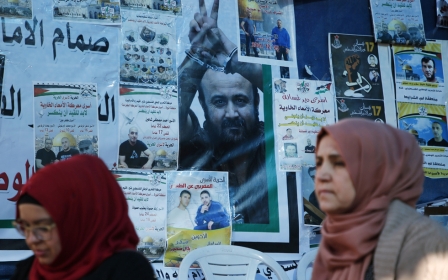Hours of insult for minutes with my brother: My monthly trip to an Israeli jail

Inas Abbad's brother, Mohammed Abbad, has been in an Israeli prison for 16 years and is one of 1,500 Palestinians on hunger strike in protest at a lack of basic rights in jail. His family gets 45 minutes a month to see him. Below is a description of visiting day, its hours of waiting, its rigorous searches, and the humiliations suffered by all.
I wake at four in the morning, knowing that I did not sleep well, like every night before I have visited my brother in prison over the past 16 years. I've spent much of the night thinking about how to tell him news about the children, his friends and family, what I should say and what I shouldn't. I don't sleep.
How will the meeting be? What will I tell him? Shall I talk, or just listen?
But this visit is different. My brother, Mohammed Abbad, told me during a previous visit that prisoners intended to go on a hunger strike to claim their legal rights. Although this is not the first strike my brother will take part in, there are special circumstances to consider.
I've spent much of the night thinking about how to tell him news of the children, his friends and family. Shall I just listen?
My brother is about to turn 40 and suffers from diseases caused by long years of imprisonment and poor nutrition, in addition to the lack of the basic health care that is supposedly guaranteed to prisoners in international law. My brother is already in need of medicine, prolonged treatment and water. A hunger strike may aggravate his illness and weaken his already skinny body.
He didn't get to say goodbye to our father before he died. Before becoming bed-ridden, my father's hearing failed - he couldn't hear his son's voice even if he did manage to drag himself to the jail.
This is a common experience for prisoners. Walid Daqqa, for example, was not allowed to contact his father, who was in agony for two months before he died in 1997. Walid was heartbroken. Houssam Shaheen also was not allowed to bid his father farewell before his death in 2016.
The journey begins
I pick up my mother from her house and we go to where the Red Cross buses are parked on al-Zahra road. The shops are closed because it's very early, and the only people here are those waiting for the bus - children, women, elderly people, some of them in wheelchairs, all wait.
Tahany Maragha, the wife of Adnan Margha, is taking her two children, Hisham and Joory, to visit their father. He did not witness their birth, hear their first words, or see them grow up. Adnan is one of the prisoners who was released during the Gilad Shalit prisoner exchange agreement in 2011, but was re-arrested a few months later after he married, and while his wife was pregnant with the twins.
The bus leaves at 5.50am for the hour and 40-minute journey to Gilboa. When it arrives, visitors line up in front of the prison door, then spend another hour waiting in the cold and rain.
During thorough inspections, screaming, complaining, and degrading treatment from prison staff, one person is let through the door every five to 10 minutes. They are lead to a hall without windows, with planks of wood for benches under a roof that is not fully completed.
Identity cards are checked and visitors are either taken to another room, or simply turned back
At 10.30am, identity cards are checked and visitors are either taken to another room, or simply turned back. This happens a lot - the family of Houssam Shaheen, who was arrested in January 2004, was not allowed to visit him for more than five years, only in military courts. Israel never explained why they prevented the visits.
After calling our names, we enter into another room and we are thoroughly inspected with am electronic device. When it rings out, as it often does, we are forced to take off some of our clothes for a closer, insulting inspection.
Then, we enter to yet another hall, this one without windows and ventilation, but full of people eager to see their fathers, sons and brothers.
Is all this waiting to punish their families? Is this why they persecute, oppress, and humiliate them?
'Daddy come to us'
We all walk down a narrow corridor covered with barbed wire fencing. Each prisoner sits behind a window and we are separated by thick, and sometimes dirty, glass so we cannot clearly see them. We use two sets of phones to communicate, and sometimes, one of them doesn't work. We sit on more wooden planks set up as benches.
The monthly visit with my brother is supposed to last for 45 minutes. This one starts without words. My mother starts crying, and the children of Adnan Margha begin to scream: "Daddy come to us, daddy come to us."
His wife begins tells them that daddy is not allowed to get out of prison, but they don't understand and they don't want to understand. All they want at that moment is to hug their father.
My mother starts crying, and the children of Adnan Margha begin to scream: 'Daddy come to us, daddy come to us'
Some may ask why prisoner Yigal Amir, who killed the Israeli prime minister, Yitzhak Rabin, is allowed to stay alone with his wife and family and hug them during a family visit, while Walid Daka, who is 56 and has been in jail for 31 years, is not allowed to meet his 47-year-old wife Sana.
Yigal's wife gave birth while he was in jail, while Sana Daka has been struggling for more than 12 years in the Israeli courts to be allowed to have conjugal visits with her husband, hoping for a child.
The paradox is that Walid Daka's case is similar to that of 14 Palestinian citizens of Israel who hold Israeli citizenship and who are held in prison. When there is a political agreement or an exchange deal, they are not included because they hold Israeli citizenship. When they demand for their citizenship rights, they are judged as "Palestinian terrorists".
Where is justice?
My brother tells us this: "I would like to inform you that the strike will continue until we get our demands, and that you might hear that I was transported and perhaps he might be in solitary confinement, I want you to be strong."
"We might die during the strike, but, mother, I would rather die than not hug my sister and her little son, who writes how much he misses hugging and playing with him."
My children Houssam, 21, Lin, 18, Hala, 14, and Rami, 10, have not seen their uncle for 16 years. My eldest daughter wants to see her uncle, as a gift when she finishes high school. In the Eid holidays, Houssam always tells his grandmother: "My uncle Mohammed is missing in the lunch table."
"Our neighbour died a week ago," I tell my brother. "When I last met him and he sent you his greetings and wishes you freedom. Your aunt Maimana wishes to see you before she dies."
Why is our 71-year-old aunt not allowed to visit him? Isn't this in itself a persecution?
Fifteen hours for 45 minutes
The visit ends and tears born of oppression fill the eyes of my mother, who remembers the death of my father, may his soul rest in peace, while she was visiting her son.
"I cannot forget how I was unable to bid my lover farewell, the lover to whom I've been married for 45 years after a love story that lasted for five years," she says.
We greet other prisoners we know in our final moments in this room. But 45 minutes every month is not enough - it's not enough even for every two weeks.
We leave the room the same way we entered, and collect our identities at the last doors of the prison. From there, we get on the Red Cross bus and wait for hours under the sun in summer and under the rain and cold in the winter, until all are visits are finished.
But 45 minutes every month is not enough - it's not enough even for every two weeks
On the bus, parents talk of their sons, and stories of disease and deprivation: Adnan Margha was in hospital twice with severe pain; Walid is in the solitary confinement, he has lost 15kg, and his health is getting worse. The prisoner Barghouti was moved from Hadarim to Gilboa, but they got him back to Hadarim.
We arrive at Jerusalem just before sunset. The mother of a prisoner has left her house before sunrise to return home after as many as 15 hours has passed to visit her son for 45 minutes.
We all left home, carrying so much sadness and sorrow, but also eagerness. We return with the same questions: why the collective punishment? Why the racial discrimination? How long will this persecution of prisoners and their families last?
This article is available in French on Middle East Eye French edition.
Middle East Eye propose une couverture et une analyse indépendantes et incomparables du Moyen-Orient, de l’Afrique du Nord et d’autres régions du monde. Pour en savoir plus sur la reprise de ce contenu et les frais qui s’appliquent, veuillez remplir ce formulaire [en anglais]. Pour en savoir plus sur MEE, cliquez ici [en anglais].







